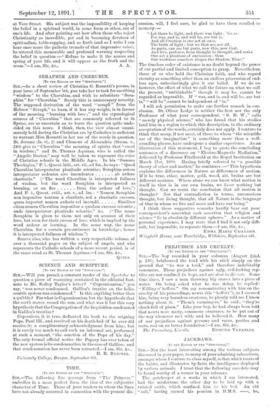TIME.
[To THE EDITOR OF THE " SPECTAT6R."]
Sin,—The following fine passage from " The Princess " embodies in a most perfect form the idea of the subjective character of Time. Those of your readers to whom the lines have not already occurred in connection with the present dis- cussion, will, I feel sure, be glad to have them recalled to memory :- " Let there be light, and there was light : 'tis so :
For was, and is, and will be, are but is,
And all Creation is one act at once, The birth of light : but we that are. not all,
As parts, can see but parts, now this, now that,
And live, perforce, from thought to thought, and make One act a phantom of succession : thus Our weakness somehow shapes the Shadow, Time."
The timeless order of existence is no doubt beyond the power of our partial and limited conception to grasp. Nevertheless,
those of us who hold the Christian faith, and who regard
eternity as something other than an endless pro. cession of end- less ages, unhesitatingly give it our belief. If we do so, however, the effect of what we call the future on what we call the present, " unthinkable " though it may be, cannot be regarded as impossible. If " was, and is, and will be, are but
is," " will be ".cannot be independent of "is."
I will ask permission to make one further remark in con- clusion. Dr. Oliver Lodge is neither the first nor the only Professor of what your correspondent, " S. D. W.," calls " merely physical science," who has found that his studies land him in a region to which this description, in the ordinary acceptation of the words, certainly does not apply. I venture to think that many, if not most, of those to whom " the scientific
use of the imagination " is something more than a well-
sounding phrase, have undergone a similar experience. As an illustration of this statement, I beg to quote the concluding sentences of a discourse on " Electro-Magnetic Radiation," delivered by Professor FitzGerald at the Royal Institution on March 21st, 1890. Having briefly referred to "a possible theory of ether and matter," he continues :—" This hypothesis explains the differences in Nature as differences of motion.
If it be true, ether, matter, gold, wood, air, brains are but different motions. Where alone we can know what motion in
itself is, that is in our own brains, we know nothing but thought. Can we resist the conclusion that all motion is thought P Not that contradiction in terms, unconscious thought, but living thought, that all Nature is the language
of One in whom we live and move and have our being."
I think these suggestive remarks hardly bear out your
correspondent's somewhat rash assertion that religion and science " lie in absolutely different spheres." As a matter of personal experience, I may state that I find it not only diffi-
cult, but impossible, to separate them.—I am, Sir, &c.,
EMMA MARIE CAILLARD.
Wingfield House, near Trowbridge, Wiltshire, September Gth.


































 Previous page
Previous page